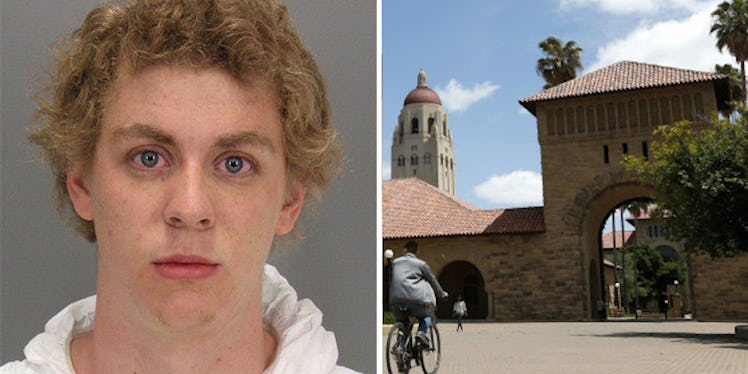
This Is What Stanford University Has To Say About The Brock Turner Rape Case
For the first time in what feels like a very long while, a campus rape case that is making headlines (because let us not forget thousands go unremarked upon by the press) has not yet focused very strongly on the role of the university where the rape took place.
Brock Turner, a Stanford freshman at the time, was discovered by two witnesses raping an unnamed, unconscious victim behind a dumpster on January 17, 2015.
Brock was found guilty of three felony counts of sexual assault and, although he could've faced up to 14 years in prison, was given only six months by the judge.
Judge Aaron Perksy, a Stanford alumnus himself, claimed he gave out such a light sentence because, as he put it, "a prison sentence would have a severe impact on him." Yes, that's the point of prison. He raped someone. It's a punishment.
According to a letter Brock wrote the judge obtained by The Guardian, Brock Turner, who remains largely unrepentant, blamed the events of that night on "alcohol" and "party culture," and he claims he never wants to attend "a social gathering that involves alcohol or any situation where people make decisions based on the substances they have consumed" -- you know, as though raping an unconscious person behind a dumpster is just something anybody could accidentally do when he or she gets drunk.
In a phone interview on Tuesday, the victim took Brock Turner's statements to task, saying,
People need to know that this way of thinking is dangerous. It's threatening. More than my emotions, it's my safety, everyone else's safety. It's not just me feeling sad and defeated. It's honest fear.
Brock Turner, his lawyers and even his father (who said the sentence was far too harsh for just "20 minutes of action") treat the rape as something that happened to Brock because of alcohol, not something Brock did to someone. This way of thinking is extremely dangerous and is only a hair's breath away from a boys-will-be-boys-when-drunk attitude.
Now, because of the straightforward circumstances of the assault (he got caught by witnesses, she was unconscious, he ran, he got convicted), Stanford University was able to hand off the case immediately to the police and the justice system, rather than having to get too involved themselves.
So, it's no surprise Stanford University has generally tried to remain silent regarding the story, which exploded into notoriety last week when the public learned of the extremely light sentence given to Turner.
But on Monday, the university released its first official statement regarding the horrible attack.
Here it is in full:
Stanford University did everything within its power to assure that justice was served in this case, including an immediate police investigation and referral to the Santa Clara County District Attorney's Office for a successful prosecution. Stanford urges its students to do the right thing and intervene and we are proud of our students for stopping this incident. Many other student witnesses cooperated in the investigation. Once Stanford learned the identity of the young woman involved, the university reached out confidentially to offer her support and to tell her the steps we were taking. In less than two weeks after the incident, Stanford had conducted an investigation and banned Turner from setting foot on campus – as a student or otherwise. This is the harshest sanction that a university can impose on a student. There has been a significant amount of misinformation circulating about Stanford's role. In this case, Stanford University, its students, its police and its staff members did everything they could. Stanford University takes the issue of sexual assault extremely seriously and has been a national leader in taking concrete steps to implement prevention programs, to train students on the importance of bystander intervention, to provide support to students who may experience sexual assault and to assure that cases are handled fairly and justly. This was a horrible incident, and we understand the anger and deep emotion it has generated. There is still much work to be done, not just here, but everywhere, to create a culture that does not tolerate sexual violence in any form and a judicial system that deals appropriately with sexual assault cases.
Now, time will tell if these claims (that the school basically just did everything right) will hold up. But, considering this country's horrendous track record when it comes to universities and colleges dealing with campus rapes, I'm, at least for now, remaining skeptical.
The silver lining in all of this, if there could possibly be any silver lining, is a letter that the victim read to her attacker in court. It is, without question, one of the most remarkable things I've ever read, and I think it does so much to articulate the horrors of a rape trial.
Here is an excerpt from it:
"I have done enough explaining. You do not get to shrug your shoulders and be confused anymore. You do not get to pretend that there were no red flags. You do not get to not know why you ran. You have been convicted of violating me with malicious intent, and all you can admit to is consuming alcohol. Do not talk about the sad way your life was upturned because alcohol made you do bad things. Figure out how to take responsibility for your own conduct."
You can read the letter in its entirety here. And I really suggest you do.
Citations: Cosmopolitan